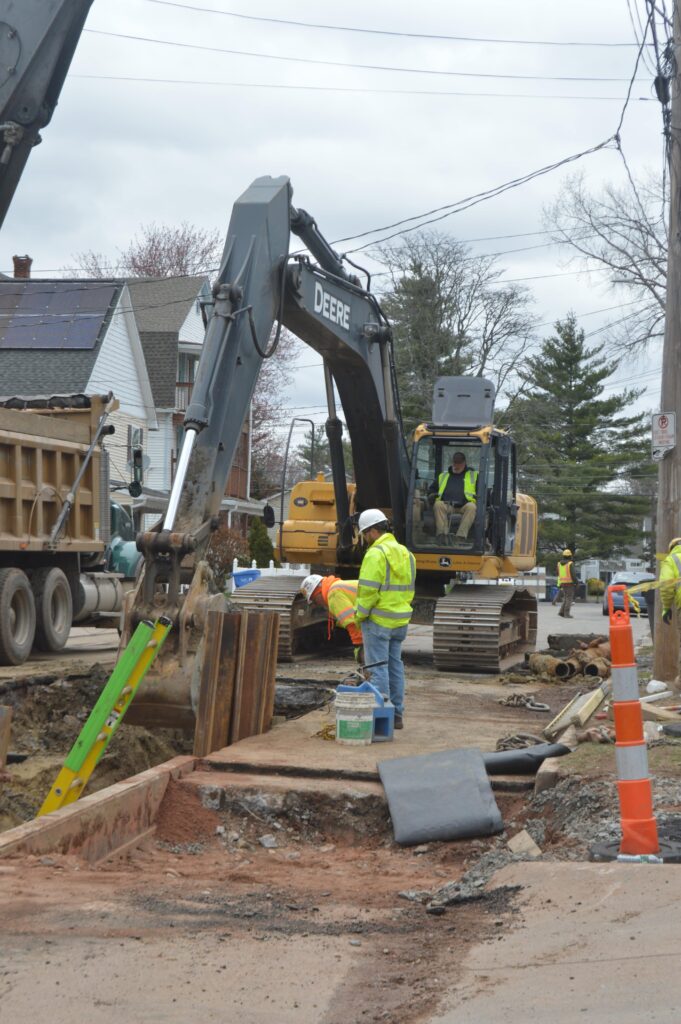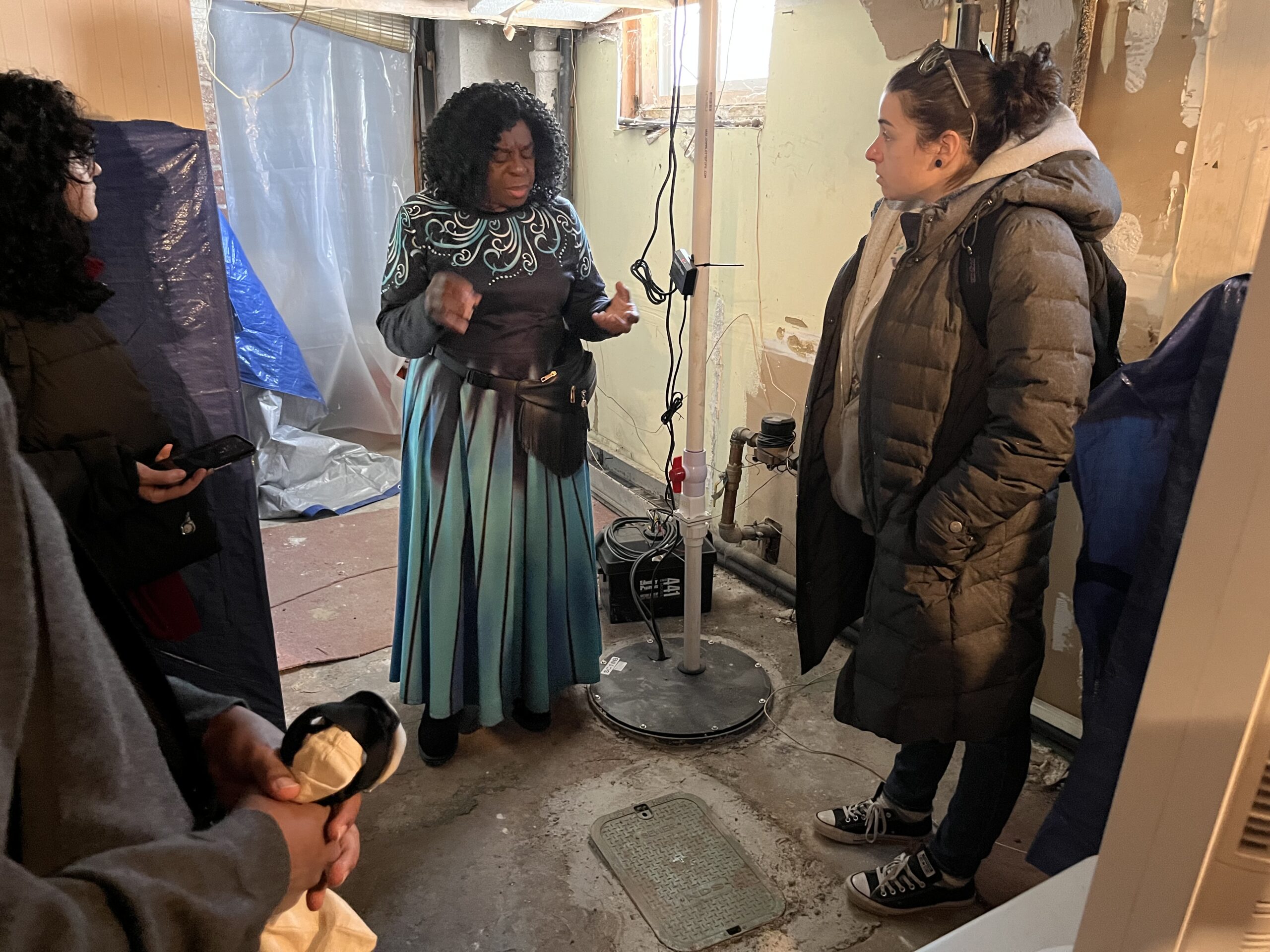By Desirae Sin
UConn Journalism
For years, many homeowners in Hartford’s North End neighborhoods could not afford costly repairs to stop flooding in their basements related to overflows from the combined sewage system. Then, in September 2023, the state launched the Hartford Flood Relief and Compensation Programs (HFRCP) to aid Hartford residents struggling with flooding.
In total, the state poured $9 million into the HFRCP and helped hundreds of Hartford residents to prevent further flooding within their homes. But the program ended in December 2024 and the Metropolitan District Commission (MDC), the city’s water and sewer agency, is still projecting a few more decades to fully replace the city’s sewer infrastructure.
When Gov. Ned Lamont announced the grants in 2023, he did so from the front lawn of a house on Granby Street, saying that the North End had “been disproportionately impacted by sewer overflows for a long time.”
Eligible homeowners in the city who experienced flood damage on or after Jan. 1, 2021, were able to receive financial assistance and reimbursement for repairs.
The grants totaling about $9 million were part of the state’s $85 million contribution to the MDC’s $170 million improvement program for the sewerage system. The state’s contribution also funded improvements on more than 3,500 private properties on things like sewer lateral repairs.
The grants for homeowners initially allocated about $5 million to over 300 Hartford residents. During the 2024 legislative session, an additional $4 million was added to the program.
This increase also expanded eligibility by including business and property owners who did not reside within the city limit. Connecticut’s Office of the State Comptroller launched the program and allocated funds to eligible residents.
“Our office was initially granted $5 million to oversee a flood compensation program. So, we launched the Hartford Flood Relief Compensation Program. We helped compensate residents based on the damage they had already received due to the neglected infrastructure in all of Hartford,” said Madi Csejka, the controller’s press secretary.
In total, 557 applications were approved with a total claim payout of around $8.8 million, according to the controller’s office report detailing the Hartford Flood Relief and Compensation Programs.
After determining their eligibility, applicants were able to apply through the state government’s website, in person at the Blue Hills Civic Association (BHCA) or by mail. The application process required various forms of identification and proof of residency in Hartford, along with any insurance claims documentation or record of repairs.
Applicants would then have to wait for the program administrator to review their application and then receive a home inspection. If all went well, residents would then receive payments to cover repairs or reimburse them for repairs they’ve already made.
“Our partnership with BHCA further solidified [our] belief in the power of working with community organizations,” Csejka said by email. “This program could not have been completed without their door-to-door outreach and application assistance.”
Although there were 776 applications in total, 219 of those were denied or did not receive grants. Csejka said these applications were denied for various reasons. Some applicants didn’t respond to notifications of the next steps in the program, others didn’t qualify as their damage was caused by ground flooding, some withdrew their applications and others didn’t meet the Nov. 1, 2024 deadline.
The program didn’t just reimburse residents for damages. Scanlon said in a press release that it “helped keep businesses open, allowed families to stay in their homes, and compensated people for irreplaceable items lost in floods.”
One resident of the Blue Hills neighborhood in the North End, attorney Cynthia Jennings, received financial aid from the HFRCP. She said she had lived with flooding her whole life and witnessed water inundating cars in driveways.
“I lost all my mother’s items after she died,” Jennings said. “Everything was molded, so I couldn’t save anything,” Jennings said. She said her basement had flooded several times and recalled how her family would wade through water to reach their washing machine and dryer.
Jennings was approved for funding to install a backflow preventer in her basement, which prevents wastewater from flooding her home.

Besides the work to stop flooding on private property, contractors for the MDC are working on the public part of the system throughout the North End. In some areas they are digging up the streets and installing two pipes, one for waste and one for stormwater. In others, they are lining pipes and repairing old pipes to prevent leakage and other problems. Jennings said the sight of “a big black and yellow truck … maybe 10 to 20 of them every day”—the workers making these upgrades—has become part of life. “They are lining the pipes underneath the ground, and they’re going through the manhole covers for most of them, unless they have to dig the street up.”
Most of the grants to repair private property were given to residents of the North End, Csejka said. “But anyone in Hartford was eligible to apply.”
According to the controller’s office report on their program, the northern half of Harford saw the most applications, with the Blue Hills neighborhood outweighing the rest of Hartford.
“The neighborhood of Blue Hills is located at the epicenter of flooding. As such, it has seen the most applications at 274,” the report states.
The same report includes the payouts to each region, with Blue Hills receiving the most funds, nearly $2.8 million. The second region to receive the most funds was Upper Albany at about $1.9 million.
But regions with higher property values had a higher average payout, due to the different costs each home required and the higher property values. The West End and Frog Hollow had the highest average payout per property at around $21,000.
With severe weather caused by climate change, it’s likely flooding in the city will remain a problem until it’s been addressed.
“This session, we requested $4 million be allocated to the program by the [state] legislature,” Csejka said. “Budget season is always a contentious one. Our office remains hopeful that the legislature will find the funds to close out the Hartford Flood Relief and Compensation Programs.”
TOP PHOTO: Cynthia Jennings shows journalists where the backflow preventer was installed in the basement of her Hartford home. Photo by Christine Woodside
